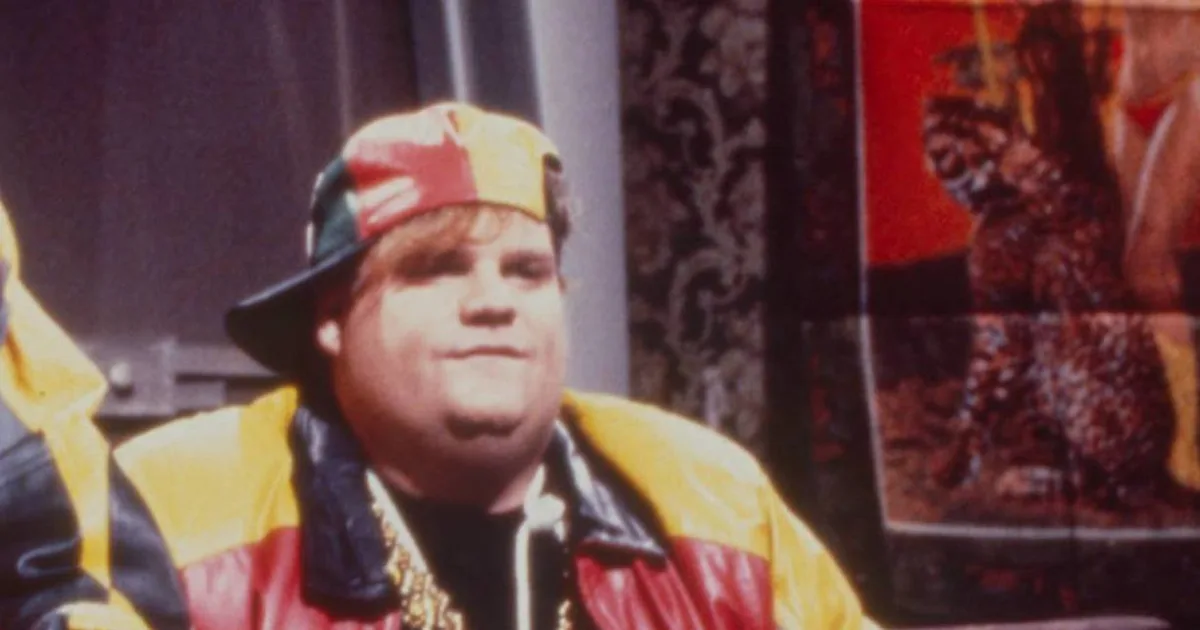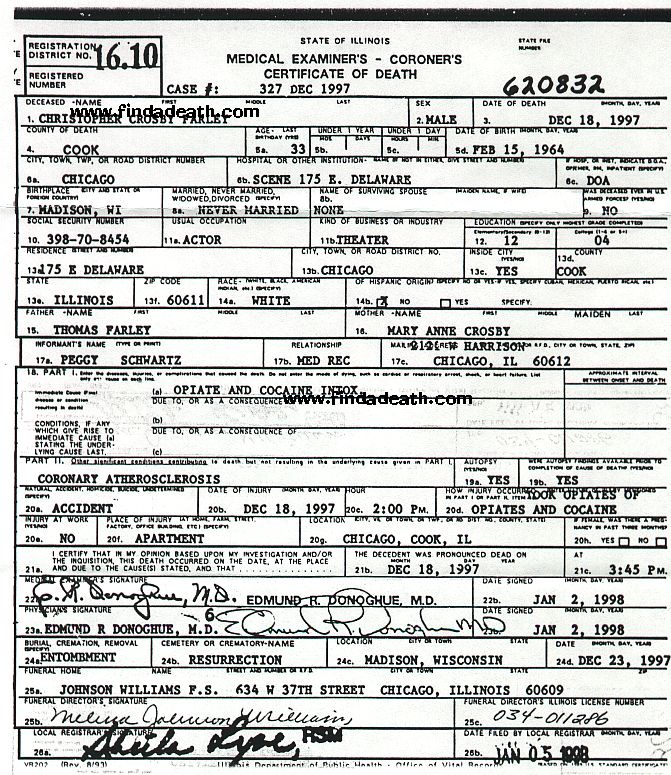Chris Farley Cause Of Death: Unveiling The Truth Behind A Tragic Loss
Chris Farley was one of those rare talents who could make you laugh until your stomach hurt. His performances on "Saturday Night Live" and in movies like "Tommy Boy" and "Black Sheep" left an indelible mark on comedy. But behind the laughter and larger-than-life persona lay a heartbreaking story that ended far too soon. Chris Farley’s cause of death remains a topic of conversation and reflection, reminding us of the struggles hidden beneath the surface of even the brightest stars.
You know, sometimes we see these celebrities on TV or in movies, and they seem invincible—larger than life. But Chris Farley’s story is a reminder that even the funniest, most beloved figures can face personal battles that are invisible to the world. His untimely death wasn’t just a shock to fans but also a wake-up call about mental health and substance abuse issues that affect so many people.
In this article, we’ll dive deep into Chris Farley’s life, his career, and the circumstances surrounding his tragic passing. We’ll explore what really happened, separate fact from fiction, and understand how his legacy continues to inspire and educate us today. So buckle up, because this isn’t just a story—it’s a lesson.
Read also:Johnny Argent The Rising Star Whos Taking The Music World By Storm
Here’s a quick rundown of what we’ll cover:
- Biography and Career Highlights
- Chris Farley Cause of Death Explained
- Substance Abuse and Mental Health Struggles
- Legacy and Impact on Comedy
- Lessons Learned from His Story
Table of Contents
- Biography and Career Overview
- Chris Farley Cause of Death
- Struggles with Substance Abuse
- Mental Health Challenges
- Family and Support System
- Impact on Comedy Career
- Legacy and Influence
- Lessons from Chris Farley’s Life
- Memorial and Tributes
- Conclusion and Reflection
Biography and Career Overview
Early Life and Beginnings
Before we get into the nitty-gritty of Chris Farley’s cause of death, let’s take a step back and look at where it all began. Born on February 15, 1964, in Madison, Wisconsin, Chris was the youngest of five siblings. Growing up, he was always the class clown, using humor to connect with others and mask his insecurities. His love for comedy started early, and by the time he attended the University of Wisconsin, he was already making waves as a standout performer.
After college, Farley moved to Chicago to join Second City, the legendary improv theater that has launched the careers of countless comedians. It was there that he honed his craft and caught the attention of “Saturday Night Live” (SNL) producers. In 1990, he joined the SNL cast, becoming one of the most memorable and beloved members of the show’s history.
Key Career Milestones
Chris Farley’s time on SNL was nothing short of legendary. He introduced iconic characters like Matt Foley, the Motivational Speaker, and his hilarious take on a Chippendales dancer. His chemistry with fellow cast member David Spade created some of the funniest sketches in SNL history. But it wasn’t just SNL that defined his career. Movies like “Tommy Boy” and “Black Sheep” showcased his ability to carry a film with sheer charisma and comedic timing.
Despite his success, Chris always stayed grounded, often crediting his family and friends for keeping him humble. His work ethic and passion for comedy were unmatched, but as we’ll see later, there were challenges lurking beneath the surface.
Chris Farley Cause of Death
On December 18, 1997, the world lost one of its brightest comedic stars. Chris Farley was found dead in his Chicago apartment at the age of 33. The news sent shockwaves through the entertainment industry and left fans reeling. So, what exactly happened? Let’s break it down.
Read also:Erika Buenfil The Rising Star Of Mexican Entertainment
An autopsy revealed that Chris Farley’s cause of death was a combination of cocaine and morphine toxicity. The official ruling was accidental overdose, meaning there was no evidence of foul play or intentional self-harm. However, this tragic event highlighted the deeper struggles Chris had been battling for years—struggles that many people didn’t fully realize until after his passing.
Unpacking the Circumstances
At the time of his death, Chris was working on several projects, including a film called “Almost Heroes.” He had recently completed filming and was preparing for its release. Friends and colleagues described him as excited about the future, making his sudden death even more heartbreaking.
It’s worth noting that Chris had been open about his battles with weight and substance abuse in the past. He even used humor to address these issues, turning them into comedic gold on SNL. But behind the scenes, the reality was much darker. His reliance on drugs and alcohol had been escalating, and despite attempts to seek help, he ultimately couldn’t overcome his demons.
Struggles with Substance Abuse
Chris Farley’s battle with addiction is a critical part of his story. Like many performers, he used substances as a way to cope with stress, anxiety, and self-doubt. Early in his career, he experimented with drugs and alcohol, but over time, these habits became more frequent and problematic.
In interviews, Chris admitted to struggling with cocaine and alcohol addiction. He even checked into rehab multiple times, hoping to regain control of his life. Unfortunately, recovery is a difficult journey, and Chris faced setbacks along the way. His friends and family tried to support him, but the pull of addiction proved too strong.
Factors Contributing to Addiction
- High-pressure environment of the entertainment industry
- Personal insecurities and low self-esteem
- Lack of long-term support systems
It’s important to recognize that addiction is a disease, not a moral failing. Chris Farley’s story serves as a reminder that even the most talented and successful individuals can fall prey to its grip. By understanding the factors contributing to addiction, we can work toward better prevention and treatment options for others.
Mental Health Challenges
Beyond substance abuse, Chris Farley also dealt with mental health issues that likely played a role in his struggles. Depression, anxiety, and feelings of inadequacy were constant companions for him, despite his outward confidence and humor. In interviews, he spoke candidly about feeling like an imposter, questioning whether he truly belonged in the world of comedy.
Unfortunately, mental health awareness was not as advanced in the 1990s as it is today. Many people, including Chris, may not have sought help due to stigma or lack of resources. His reliance on humor to mask his pain became both a strength and a weakness, allowing him to connect with audiences while keeping his vulnerabilities hidden.
Breaking the Stigma
Today, conversations around mental health and addiction are more open and accepting. Celebrities like Dwayne Johnson, Lady Gaga, and others have spoken publicly about their struggles, encouraging fans to seek help. Chris Farley’s legacy can inspire others to prioritize their mental well-being and reach out for support when needed.
Family and Support System
Throughout his life, Chris Farley’s family remained a constant source of love and encouragement. His parents, Thomas and Mary Ann Farley, were pillars of strength, especially during tough times. His brother, John Farley, has carried on Chris’s legacy by sharing stories and keeping his memory alive.
After Chris’s passing, his family established the Chris Farley Foundation, which focuses on promoting health and wellness through laughter and fitness. This organization reflects the values Chris held dear and continues to make a positive impact in communities across the country.
The Role of Support Systems
Having a strong support system is crucial for anyone dealing with addiction or mental health challenges. While Chris had a loving family, he may not have had access to the professional resources he needed. Modern advancements in therapy, counseling, and peer support programs offer hope for those facing similar battles.
Impact on Comedy Career
Chris Farley’s influence on comedy cannot be overstated. His unique style of physical comedy, combined with his ability to connect emotionally with audiences, set him apart from other performers. Even today, comedians cite him as a major influence, praising his authenticity and passion for the craft.
Despite his untimely death, Chris left behind a body of work that continues to entertain and inspire. Movies like “Tommy Boy” and “Black Sheep” remain fan favorites, and his SNL sketches are still quoted and referenced decades later. His contributions to comedy will never be forgotten.
Legacy in Comedy
Chris Farley’s legacy extends beyond his performances. He paved the way for future comedians, proving that humor can be both intelligent and heartfelt. His willingness to tackle tough subjects with humor and vulnerability opened doors for others to do the same.
Legacy and Influence
Even 25 years after his passing, Chris Farley’s influence is still felt in the world of comedy and beyond. Fans continue to celebrate his life and career through tributes, documentaries, and social media posts. His ability to bring joy and laughter to people’s lives remains unmatched.
But Chris’s legacy isn’t just about the laughs. It’s also about the lessons he taught us about resilience, authenticity, and the importance of mental health. By sharing his story, we honor his memory and help others who may be facing similar challenges.
Lessons from Chris Farley’s Life
Chris Farley’s life and death offer valuable lessons for all of us. Here are a few takeaways:
- Laugh often, but don’t hide your pain behind humor.
- Seek help when you need it—there’s no shame in asking for support.
- Surround yourself with positive influences and a strong support system.
- Embrace your imperfections—they’re what make you unique.
These lessons are especially relevant in today’s fast-paced world, where mental health and self-care are more important than ever.
Memorial and Tributes
Since Chris Farley’s passing, numerous tributes have been held in his honor. The Chris Farley Foundation continues to thrive, promoting health and wellness initiatives that reflect his values. Fans also gather annually to celebrate his life and career, ensuring that his memory lives on.
In 2020, a documentary titled “Chris Farley: Anything for a Laugh” premiered, offering a deeper look into his life, career, and the circumstances surrounding his death. This film brought renewed attention to his legacy and sparked important conversations about mental health and addiction.
Conclusion and Reflection
Chris Farley’s cause of death was a tragic event that shocked the world, but it also opened up important discussions about addiction, mental health, and the pressures of fame. His story reminds us that even the brightest stars can face struggles that are invisible to the world. By learning from his experiences, we can create a more compassionate and understanding society.
I encourage you to share this article with others, start conversations about mental health, and remember the legacy of a truly remarkable person. Chris Farley may be gone, but his laughter and lessons continue to inspire us all. So, let’s keep the conversation going and honor his memory in the best way possible—by helping others who may be facing similar challenges.
Article Recommendations


